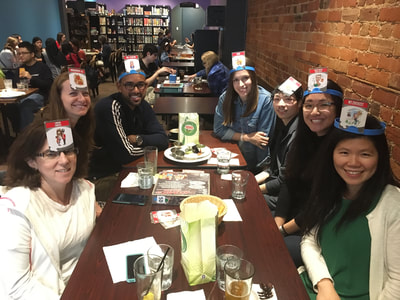Mission: The TEMPO Lab aims to discover and understand how to enhance a person’s ability to learn motor skills. We study factors that optimize motor learning such as, augmented feedback, non-invasive brain stimulation, and aerobic exercise, in typically developing individuals and people living with stroke. We use techniques such as behavioural testing, magnetic resonance imaging, and non-invasive brain stimulation. These approaches allow us to better understand the brain’s capacity for, to determine biomarkers that predict, and to elucidate neural mechanisms that underlie, learning.

Key Themes:
- Motor learning
- Music perception and production
- Stroke recovery and rehabilitation
- Neuroplasticity
- Biomarkers
Scientific Team
Director
MSc students
Andrea Hung, BSc
Undergraduate students
Aran Bains, KPE 390
Research Coordinator
Kay-Ann Allen
Research Physiotherapist
Ellen Cohen
Previous Trainees
Dana Swarbrick, MSc student
Nirsan Kunaratnam, MSc student
Timothy Lam, MSc student, Research Assistant
Shinya Fujii, post-doctoral fellow, presently Assistant Professor, Keio University, Japan
Ashley Schipani, undergraduate summer student, Wilfred Laurier University
Payal Gandhi, undergraduate co-op student, University of Waterloo
Alvina Siu, undergraduate summer student, McMaster University
Ayeesha Tasneem, undergraduate summer student, University of Toronto
Kanako Sugita, visiting student, Japan
Tea Lulic, Research Assistant
Research
Current Projects
We are studying how to naturally facilitate learning-dependent neuroplasticity through aerobic exercise. Aerobic exercise naturally induces the release of various neurochemicals that may promote neuronal growth and signaling to support motor learning. The pairing of high intensity aerobic exercise after motor skill acquisition enhances skill retention. We are studying whether baseline fitness influences these effects, and whether we can translate these fundamental research findings to help musicians enhance their performance.
Transcranial direct current stimulation, tDCS, is a technology that directly modulates neuroplastic mechanisms related to learning via stimulation of the cortex through the scalp. Combining tDCS with practice may enhance a person’s capacity for motor learning. Our fundamental research aims to understand how tDCS exerts its effects, and what kind of performance advantages it may yield.
The application of tDCS combined with physical therapy has the potential to enhance the recovery of movements more than therapy alone (i.e. without the stimulation). While tDCS may ‘work’, it doesn’t seem to work for everyone. We believe a personalized approach to tDCS is required to maximize the effects of therapy for each person. We are testing whether a biomarker of motor recovery from stroke, the amount of damage to the corticospinal tract, predicts treatment response to tDCS. Stroke survivors perform goal-directed reaching while receiving different types of tDCS. The movements are tracked with motion capture systems to allow for a fine-grained analysis of tDCS effects on kinematics.
Publications
Educational Opportunities
I am looking for highly motivated students to join the TEMPO Lab. Interested individuals should contact Professor Chen (joycelynn.chen@utoronto.ca) with a cover letter indicating their background and research interests, a curriculum vitae, and an unofficial copy of their transcript. Tell me why research in the TEMPO Lab interests you, and what kind of projects you want to pursue.
I am accepting MSc and PhD degree students through the Faculty of Kinesiology and Physical Education. I am also affiliated with the Rehabilitation Sciences Institute.
I am accepting undergraduate students who want to volunteer, do a work study internship, and/or do an undergraduate research project as part of their course work.
Contact
Joyce L Chen, PhD
Assistant Professor
Faculty of Kinesiology and Physical Education
University of Toronto
55 Harbord Street
Toronto, ON M5S 2W6
Email: joycelynn.chen@utoronto.ca
Phone: 416-946-5394